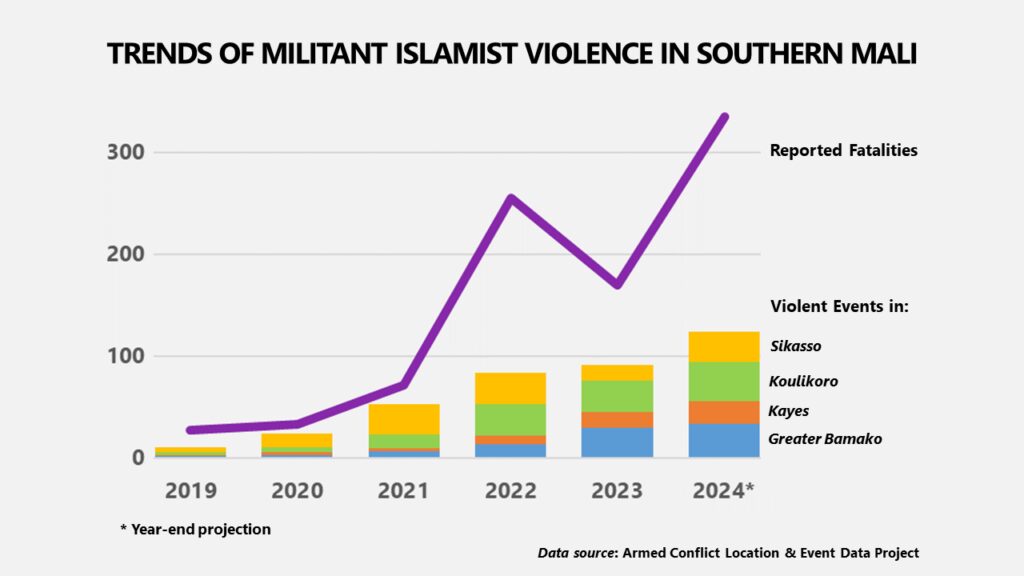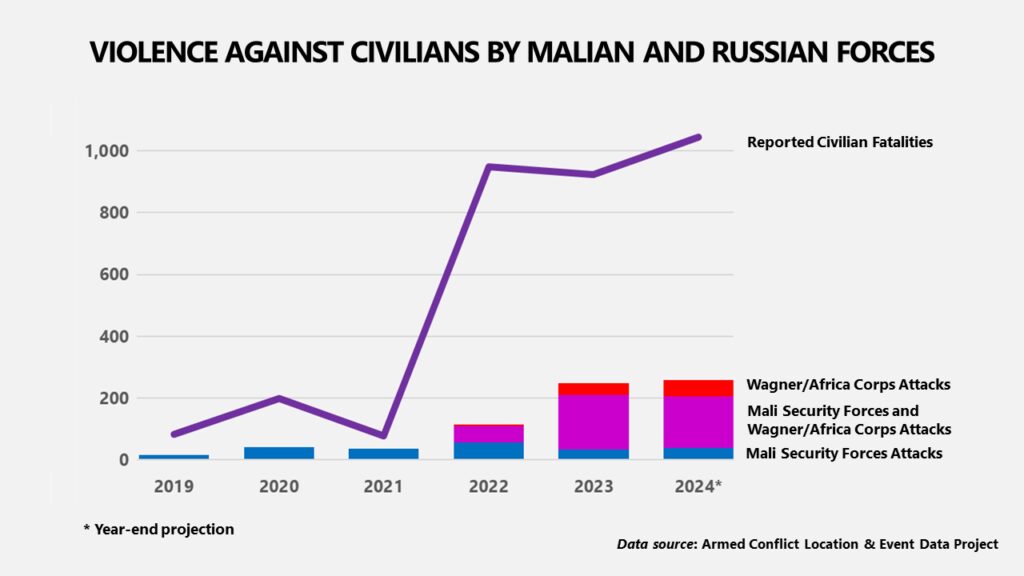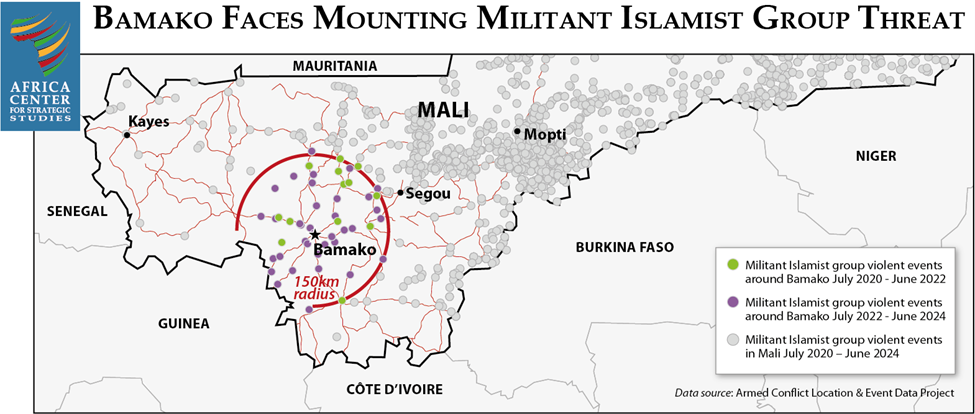The recent militant Islamist attack in Bamako is part of a broader push by violent extremist groups into southern Mali and reflective of the deteriorating security in Mali under military rule.
Militant Islamist fighters stormed a gendarmerie school and military base inside Mali’s capital, Bamako, on September 17, 2024. Some 77 people died in the attack, which also left hundreds injured. It took security forces hours to repel. In a video of the attack released by the militant Islamist coalition, Jama’at Nusrat al Islam wal Muslimeen (JNIM), it appears that the militants set the presidential plane on fire. This was the first time in 9 years that militant Islamist groups struck within the city. The militants’ targeting of security facilities rather than less protected soft civilian targets is noteworthy for its planning, execution, and objective to degrade the capacity of security forces.
Rather than a one-off exception, the attack is part of a pattern of escalating violent incidents in the greater Bamako area in the past 2 years by the JNIM coalition, primarily the Macina Liberation Front led by Amadou Koufa.
This growing pressure on Bamako reflects a broader deterioration of security in Mali under the military junta that seized power in August 2020. Since then, militant Islamist groups have shown increased capabilities to extend their reach into southern Mali from their strongholds in northern and central Mali.

- Attacks within roughly 150 km of Bamako are projected to nearly triple to 34 in 2024, compared to 13 violent events in 2022 and 3 militant Islamist group incidents in 2020.
- Fatalities linked to militant Islamist groups in southern Mali more generally are projected to double this year (to 335 deaths) compared to last year.
- Militant Islamist groups continue to push toward Mali’s borders with its coastal neighbors. In the past year, there have been two dozen such incidents within 50 km of Mali’s borders with Côte d’Ivoire, Guinea, Senegal, and Mauritania. In previous years, there had been virtually no violent events in this area.
- These trends upend claims from the military junta that the security situation in Mali is improving.
Escalating Human Rights Abuses under the Military Junta

- The junta brought in an estimated 1,000 Russian Wagner Group mercenary forces in 2022 while forcing the departure of roughly 20,000 United Nations (UN), West African, and European forces despite the rising security threat.
- Under the junta, civilian fatalities linked to the Malian armed forces and Russian mercenaries have increased from 84 civilian deaths in 2019 to 924 in 2023 and a projected 1,044 civilian fatalities in 2024. This exceeds the number of civilians in Mali killed by militant Islamist groups.
- A spike in civilian fatalities in 2022 coincides with the arrival of the Wagner Group forces. Most notoriously, it is linked to an attack on the town of Moura, where the Malian armed forces and Wagner have been credibly accused of killing more than 500 civilians. This attack occurred roughly 3 months after Wagner’s arrival in Mali.
- These attacks on civilians have undercut public trust and exacerbated tensions with communities in contested regions. Security sector violence against civilians, moreover, is a well-established amplifier of violent extremist recruitment.
- The incidents have coincided with a concerted effort by the military junta to suppress independent reporting from Mali. Media outlets have been shuttered, journalists arrested, and UN monitors forced out of the country.
- The junta’s decision to reignite fighting with Tuareg separatist groups in northern Mali has meanwhile afforded militant Islamist groups in central Mali space to organize and expand into the southern regions.
Security Sector Governance Key to Successful Counterinsurgency
The military junta has justified its unconstitutional seizure of power on the promise of delivering security. Instead, security has dramatically worsened. Bamako and neighboring coastal West African countries are increasingly under threat. The junta has, nevertheless, repeatedly broken its promises to transition back to a legitimate civilian government.
Successful counterinsurgency is reliant on accountable security sector governance. Among other things, this entails a legitimate government that establishes positive relations with communities in contested areas, popular support and trust in government leaders, and a disciplined military that respects human rights.
In addition to helping stabilize Mali, improved security sector governance and a transition back to civilian rule in Mali would facilitate renewed regional security cooperation between Sahelian and coastal West African countries to control their shared borders and reverse the momentum of the militant Islamist groups.
Additional Resources
- Africa Center for Strategic Studies, “Africa’s Constantly Evolving Militant Islamist Threat,” Infographic, August 13, 2024.
- Daniel Eizenga and Amandine Gnanguênon, “Recalibrating Coastal West Africa’s Response to Violent Extremism,” Africa Security Brief No. 43, Africa Center for Strategic Studies, July 2024.
- Africa Center for Strategic Studies, “Assessing Mali’s Non-Transition,” Infographic, February 2, 2024.
- Africa Center for Strategic Studies, “Mali Catastrophe Accelerating under Junta Rule,” Infographic, July 10, 2023.
- Africa Center for Strategic Studies, “Malian Military Junta Scuttles Security Partnerships while Militant Violence Surges,” Infographic, February 27, 2023.
- Africa Center for Strategic Studies, “Debunking the Malian Junta’s Claims,” Spotlight, Africa Center for Strategic Studies, April 12, 2022.
- Joseph Siegle and Daniel Eizenga, “Beware the Popular Coup,” AllAfrica.com, August 30, 2020.

